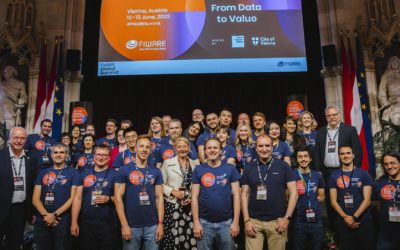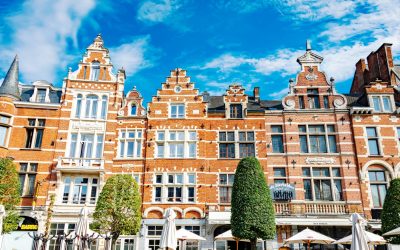Cities now have a greater chance than ever before to provide the smart infrastructure that offers more meaningful ways for citizens, local business and city services to interconnect, improve their daily life processes, and create an economy based on data.
The United States’ White House has today announced a new global coalition to create a shared Internet of Things-Enabled Smart City Framework. The coalition will identify pivotal points of interoperability, where emerging alignment on standards can enable landscape of diverse but interoperable smart city solutions. The FIWARE initiative has been invited to contribute because of the relevance gained by FIWARE as vendor-neutral platform defining standards that make it possible for all types of businesses and industries to build and share portable and interoperable smart city solutions around the globe. The new initiative is being led by the US National Institute of Standards and Technology (NIST) in a global partnership with the American National Standards Institute, the U.S. Green Building Council, the Republic of Korea’s Ministry of Science, ICT, and Future Planning, the Italian Energy and Innovation Agency, the European Telecommunications Standards Institute, and the FIWARE Foundation.
The lack of global standards in the design of smart city technologies has been the single greatest obstacle preventing more rapid adoption of smart city infrastructure. NIST and its global partners will work together to identify where interoperable standards are advancing sufficiently to speed up the uptake of smart city solutions. The FIWARE NGSI API (Application Programming Interface) specifications are one of the most advanced examples of a standard that is being adopted and recognized by city leaders. It provides a mean for getting access to context information describing what is going on (and historically) in a city at any time. Use of FIWARE’s open source tools based on FIWARE NGSI mean that any project can apply an interoperable standard and connect a broad range of data, sensors, and smart technologies in their solution.
For several years now, FIWARE has been building a common set of open source tools based on the FIWARE NGSI API so that any business can create a smart city solution and replicate worldwide. This has been done in partnership with the Open and Agile Smart Cities (OASC) initiative, a global collaboration involving over 89 cities from around the globe.
The FIWARE strategic model began with innovative startups and business leaders working with OASC member cities to identify key local challenges. By applying their smart city solutions across multiple locations, businesses and cities have been able to work together to identify a common data model. This data model can be used in conjunction with FIWARE’s NGSI standard API which means that with these two components together, smart city solutions are interoperable and may deal with a vast array of sensors, hardware, fleet vehicles, machinery and other technologies in any location.
By taking this bottom-up approach, smart solutions have been better able to focus on solving the real challenges facing city partners and have begun to generate a global marketplace where businesses can scale their solutions and adapt them to any new city quickly and efficiently. There are now twelve data models being developed and tested by the FIWARE Community with real applications for key common city issues including air quality and environmental conditions, street lighting, waste management and car parking.
“So far, the idea of smart cities has been focused on more efficient management of city-provided services. But smart cities have to be something more. They have to be the main enabler for economic development,” said Juanjo Hierro, FIWARE Chief Architect. Hierro said this vision has been fundamental to FIWARE, which has now created an ecosystem of startups and businesses investing their time and resources into creating solutions that can interoperate with other solutions and more easily be ported from one city to another.
For example, a car navigation system that draws on real-time traffic, car parking availability, local tourist sites of interest, and air pollution data can work equally well in one city where one type of car parking sensor is used, as with another which has its own method of tracking traffic and car parking availability or that catalogs local points of interest differently. Similarly, water quality projects that make use of one city’s sensor technology can be replicated in another city where a different type of water sensor is used. Using the FIWARE platform and common data models, cities can also share best practices and speed up the development of a Global Digital Single Market for Smart Cities.
To spur this ecosystem of startups and businesses creating solutions in partnership with cities, FIWARE has partnered with TM Forum to create a set of business support enablers that help to monetize data and create innovative business models involving multiple players, whether that be the manufacturer of the hardware deployed, the collector and publisher of the data that is added to help make sense and contextualize the solution to the local environment, or the system integrator partners who ensure that solutions are in the hands of the citizens and users who need access. “TM Forum’s APIs and FIWARE’s APIs enable real-time access and management of city data, provide an innovative suite of tools for third party developers which together can significantly improve overall interoperability across complex smart city services. TM Forum APIs work on any technology and any service, are free to the public and enable interoperability and end to end management of these services,” said Joann O’Brien, Vice President of APIs and Ecosystems at TM Forum.
“Cities prioritize sustainable economic development above all, but it has become clear that in order to achieve this, we need a harmonized global smart city market that connects to local realities. Common standards, which are practical and easy to use, are key for cities that want to be open and agile,” said Martin Brynskov, Chair of the OASC initiative.
“Cities are beginning to embrace the value of city platforms and the innovation, economic growth opportunities and citizen engagement they can drive. Standardized APIs are a critical element of making this happen,” comments Carl Piva, Head of TM Forum’s Smart City Forum.
Today’s announcement by the White House represents a significant step towards solving the lack of common standards which was considered as the major bottleneck holding back economic development and the growth of the smart city ecosystem.
The FIWARE open source community has been instrumental in building the FIWARE platform to the stage of maturity it has currently achieved. “The creation of the FIWARE Foundation will continue to drive community input and leadership on the adoption of open standard APIs and the data models being used by cities and solution providers” explains Ulrich Ahle, CEO of the FIWARE Foundation. The FIWARE Foundation gives FIWARE greater strength and gives cities and business more confidence in being able to access a set of open source standards and tools that are not locked within any vendor.



